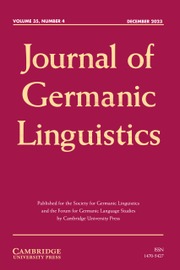No CrossRef data available.
Article contents
A Note on MHG schulde(n) in the Nibelungenlied
Published online by Cambridge University Press: 05 December 2008
Abstract
This word study traces the use of schulde(n) through the Nibelungenlied focusing on the central episodes in âventiuren 14–19. Considerable synchronic variability exists in the lexical semantics of MHG schulde(n). This variability is explicable in terms of the etymological development of schulde(n), a variability which is systematically exploited throughout the work. As the plot unfolds, the occurrences of this word and its closest derivational relatives shift steadily from semantically bleached uses and the neutral meaning of ‘obligation’ toward the narrow meaning ‘guilt’.
- Type
- Articles
- Information
- Copyright
- Copyright © Society for Germanic Linguistics 1993




